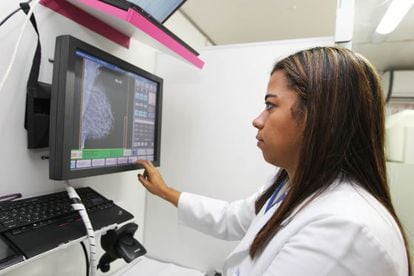Triple negative breast cancer affects more women under 40
Forty years ago, of all women diagnosed with breast cancer, around 70% remained at least five years without suffering a relapse.
Now, that figure is closer to 90%.
This progress has been achieved, among other things, thanks to the understanding of the enormous diversity of this disease.
Chemotherapy since the 1970s had demonstrated its ability to improve patients' prospects when applied after surgery.
Hormonal treatments were added and, later, targeted therapies, effective against tumors that overexpress the HER2 protein, which have gradually reduced the impact of breast cancer.
However, there is a type of these tumors whose weaknesses are unknown, such as those that have made previous advances possible.
known as triple negative,
because their cells do not have estrogen or progesterone receptors and produce little HER2, they still have few therapeutic options.
They are around 15% of breast tumors, they are more common among women under 40, much more aggressive and with a worse prognosis.
Today, the
New England Journal of Medicine
publishes the results of a study that offers a new therapeutic option to these patients.
The trial, in which 847 patients participated, has shown that, when an immunotherapy drug, pembrolizumab, is added to the usual treatment of these tumors, chemotherapy, the average survival increases by seven months in patients with advanced triple-negative cancer : from 16.1 months to 23. Seven months more overall survival than the authors of the study, led by Javier Cortés, director of the IBCC (International Breast Cancer Center) in Barcelona, consider a "very relevant" figure.
Experimental treatments are being tested in people with worse prospects, but will offer more benefit in patients with less advanced tumors
To achieve this benefit, those responsible for the trial have identified a marker with therapeutic utility.
PD-L1 is a protein that our body uses to identify healthy cells and prevent our own immune system, in addition to eliminating harmful viruses or bacteria, from harming us.
This protective function is also used by some tumor cells, the authentic malignant reverse of our normal being, to avoid being detected and destroyed by our defenses.
Immunotherapeutic treatments, such as the monoclonal antibody pembrolizumab, used in this study, are capable of removing this mask from cancer and exposing it to the immune system.
40% of people with triple negative breast tumors have high levels of this biomarker and may benefit from the new treatment.
Sara López, medical oncologist at Hospital Gregorio Marañón and member of the Geicam breast cancer research group, believes that the result is important, and “not only because of the overall increase in survival”.
“Between 2000 and 2017, with this group of patients, only a seven-month improvement has been achieved, and it is very little.
Immunotherapy, which has shown a response in many tumors, has hardly done so in breast cancer”, explains López, who has not participated in the study.
"This is going to open the door for immunotherapy to continue to be explored for breast cancer and that is important," she adds.
Like all experimental treatments, they are first tested among people with the worst prospects, but will offer more notable benefits when applied to patients with the least advanced tumor.
Javier Cortés recalls that the seven-month survival increase recorded in the study "is the largest in the history of metastatic triple-negative breast cancer", although he acknowledges that it is necessary "to continue investigating in order to continue improving quality of life and survival of these patients.
In addition, he highlights the importance of having a marker like PDL1 to continue improving the classification of tumors that until now had few options.
In the effort to gain ground against cancer, the classification of tumors is combined according to their characteristics and the possibilities offered by different drugs, alone or in combination, to stop them.
Cortés points out that in the future the combination of Trojan horses with immunotherapy will be important.
The former are drugs that combine a targeted drug to deliver chemotherapy to the tumor and release the load there with greater intensity and fewer side effects.
Immunotherapy could also unmask tumors that are hidden under the expression of proteins such as PDL1 and increase the efficacy of other drugs.
César Rodríguez, vice president of the Spanish Society of Medical Oncology (SEOM), agrees on the importance of the results.
On the one hand, he states that "although the added seven months of survival may seem little to the public, the great advances in oncology are produced by adding seven months here and seven months there, until years of survival are achieved."
Rodríguez, who is an oncologist at the University Hospital of Salamanca, also highlights the contribution of this work to precision medicine.
"The study shows that people with higher expression of PDL-1 [about 40%] benefit a lot, while those who do not have this expression hardly benefit," he explains.
“That is going to allow us to give treatment to patients who are really going to benefit,
You can follow
EL PAÍS Salud y Bienestar
on
,
and
.









/cloudfront-eu-central-1.images.arcpublishing.com/prisa/KMEYMJKESBAZBE4MRBAM4TGHIQ.jpg)


